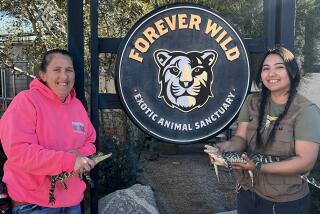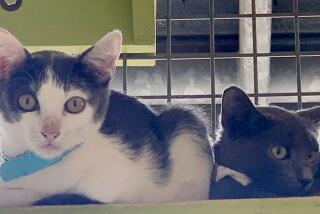Squirreled Away, Ferrets Weasel a Second Chance
- Share via
CHICAGO — Deep in the basement of a suburban house, 220 homeless ferrets frolic with toy balls, crawling tubes and other ferret-phernalia in a makeshift halfway house for the weasel-like creatures.
The animals, all given up by their owners or between homes, are the pride and joy of Mary van Dahm, who keeps 14 ferrets of her own upstairs.
It started 18 months ago, when a group of Chicago-area residents formed the Greater Chicago Ferret Assn. Van Dahm, the only founding officer with a basement, was asked to run the shelter. She agreed.
So when a Chicago woman recently asked her veterinarian how she could dispose of two pet ferrets her son had outgrown, she was referred to Van Dahm.
In her basement, the ferrets live in cages until new owners claim them. “We’ve gotten ferrets from all over the country,” said Van Dahm, who prefers to keep her address secret so as not to disturb her neighbors.
Some of the animals came from New Jersey. A batch arrived from Kentucky after Louisville animal welfare agents seized 19 ferrets from a woman who kept them in a cramped back-yard shed.
Others were relinquished by disenchanted owners.
“It was not what I expected,” one woman said. She complained that her ferret did not like to sit in her lap to be stroked like a cat.
“They are more exotic than dogs or cats,” Van Dahm said. “They are good for apartment dwellers, because they are small and can be kept in cages most of the time.
About 10,000 of an estimated 5 million pet ferrets in the nation are in the Chicago area, said Janice Miller, president of the Greater Chicago Ferret Assn., based in suburban Westchester. The animals usually are not legal as pets in California.
Ferret lovers say the animal’s reputation as a sometimes-vicious biter is unfounded.
Often mistaken for rodents, ferrets are related to weasels and minks. They can be trained to use litter boxes and will eat cat food.
More to Read
Sign up for Essential California
The most important California stories and recommendations in your inbox every morning.
You may occasionally receive promotional content from the Los Angeles Times.













